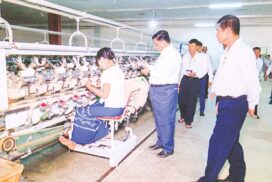With the cooking oil prices rocketing, edible oil adulteration with inferior oil is happening, the consumers stressed.
Consumers cannot easily detect blended edible oil with impurities like high-grade rice.
The retail price of palm oil is around K8,000 per viss, while peanut oil prices peaked at K15,000 per viss. The consumers have high concerns over the possible oil adulteration, a housewife Daw Nyo Ei from Sangyoung Township, told the Global New Light of Myanmar (GNLM).
“The retail prices of cooking oil are K15,000 per viss of peanut oil and K8,000 per viss of palm oil. Some unscrupulous sellers blend peanut oil with palm oil to exploit skyrocketing oil prices to increase profits. Only the consumers suffer damage because of a defect with the product amid high prices,” she elaborated.
The producers and sellers should ensure quality control. The consumers have to buy the edible oil at the prevailing market price although they cannot detect the quality.
The production of oil varies depending on the peanut. The peanut price and other factors in the production process determine the oil prices.
In 2000, popular branded palm oil barrels were found at some peanut oil mills.
Those sellers add some ratio of palm oil into peanut oil for business profits, a trader told the GNLM.
After that, there are lots of blended cooking oil cases. Some add just artificial peanut flavour into the palm oil and sell the fake peanut oil in the market at a fairer price. The price for peanut flavour is just K100 per viss.
The consumers are aware of the fake peanut oil due to the cheap price yet they offer higher prices for fake cooking oil with peanut favour.
There were about K1,000 price differences between palm oil and peanut oil in late 2021.
The wholesale price of peanut oil was around K5,000 per viss on account of low peanut prices. Thereafter, the peanut price moved onwards and hit K7,000 per viss in August 2023.
The wholesale prices in the peanut-producing area Monywa and bustling Mandalay market stood at K13,000-14,000 per viss of peanut oil and K12,000-13,000 per viss of sesame oil in the first week of August 2023.
Those wholesale commodity depots did not set the opening price for palm oil, which is highly demanded in the domestic markets.
In addition to high-grade peanut oil, oil adulteration is also found in palm oil grasping a large market share, the GNLM quoted a seller from Mandalay market as saying.
Palm oil was earlier imported in barrels in the 2000s. At present, they are directly put into palm oil tanks by pumping oil from tankers.
The traders claim palm oil at the port with their own barrels to discharge from oil tankers.
Rocketing palm oil prices force some food premise operators to use repeatedly heated cooking oil which turns darker. Some businesses use bleaching agents to remove the dark colour from repeatedly heated oil in order to resell them in the market at cheaper prices.
Oil blends such as palm stearin, cottonseed oil, niger oil and animal fat are also detected in the market. Pork fat was earlier used in fried noodles due to its sweet taste.
Cotton seeds were commonly utilized in making soap. Now they are found in some blended oil, U Zaw Win from cotton-producing Meiktila Township, explained to the GNLM.
Consumers are facing the health hazards of those blended oils at reduced prices while the sellers are making more profits.
Those degraded cooking oil harms health due to profiteering in dishonest acts.
A buyer Ma Khin Myo called for regulatory inspection and market surveillance for label-less cooking oil in the markets and law enforcement to protect the interests of the consumers. — TWA/EM
Consumers call for hazard assessment of edible oil
- August 11, 2023
- 289















